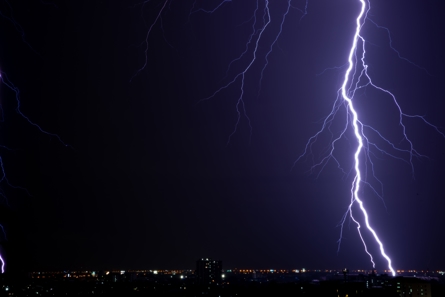One can look at summer's arrival as a case of the good, the bad, and the ugly. While the increasing warmth and plans for summer activities are welcome, there’s also an increase in summer storms and other severe weather events.
Unfortunately, those conditions bring a risk of property loss. Storm-related wind, rain, and flooding are major culprits in property damage—however, a more insidious troublemaker tags along in the form of power outages. High winds, lightning strikes, and flash flooding can damage overhead lines, transformers, and substations. Even one fallen tree or snapped line can leave hundreds or thousands of homes in the dark.
Losing electricity is more than an inconvenience. For homeowners, it can cause food to spoil, security systems to shut down, and flood-prevention equipment like sump pumps to fail while creating potentially dangerous conditions inside and outside the home. Read on to see why these outages happen, their risks, and how to prepare your home to weather the storm.
MAJOR WEATHER EVENTS THAT CAUSE POWER OUTAGES
Thunderstorms
Spring and summer are peak seasons for thunderstorms. It's easy to underestimate their impact because they are common and often pass without incident. Lightning strikes can short out transformers, though, while gusty winds can break tree branches that land on power lines. In some cases, flash flooding may cause electrical hazards and service disruptions, especially in low-lying areas.
Tornadoes
Tornadoes may be short-lived, but the destruction they cause is often swift and severe. Highly destructive, they can damage property, power grids, and infrastructure beyond repair. Accordingly, tornado-related outages can cut off power for entire communities.
Hurricanes
Unlike tornadoes, hurricanes can be tracked days in advance, but their path and impact are often unpredictable. As with thunderstorms and tornadoes, high winds and rain can threaten power systems. Storm surges and flooding are additional dangers, as they can affect a wide area for extended periods. Power outages caused by hurricanes can last several days—or even weeks—especially in coastal areas.
THE IMPACT OF POWER OUTAGES ON YOUR HOME
Extended outages can take a serious toll on you and your property. Common problems include:
- Food spoilage in refrigerators and freezers.
- Health risks from loss of air conditioning, especially in the hotter summer months.
- Sump pumps stop working, potentially leading to basement flooding during storms.
- Security systems go offline, leaving your home vulnerable.
- Improper use of alternate lighting and power sources, such as candles and generators, can result in fire or carbon monoxide exposure.
HOW TO PREPARE YOUR HOME FOR POWER OUTAGES
Even a few hours without power can disrupt daily life, so planning is essential.
Before the Storm
Preparation is key to minimizing damage and stress during an outage. Here’s how to get your home storm-ready:
- Install surge protectors on major appliances and electronics.
- Invest in a backup generator or battery power station to keep essentials running.
- Trim back overhanging branches that could fall on your roof or power lines.
- Keep an emergency kit with flashlights, batteries, water, non-perishable food, and a first-aid kit.
- Ensure your sump pump has a battery backup if your home has a basement andis prone to flooding.
During the Outage
Stay safe and reduce damage with a few simple steps:
- Keep fridge and freezer doors closed to preserve cold air.
- Use flashlights instead of candles to prevent fire hazards.
- Unplug electronics to avoid damage when the power comes back on.
- Stay informed through weather updates and emergency instructions.
What to Do After the Storm Passes
- Be cautious. If cleaning up storm debris, avoid fallen power lines and downed wires. Only enter a flooded basement if you are sure the power is disconnected. Only use flooded appliances, electrical outlets, switch boxes or fuse-breaker panels once a qualified electrician has checked and cleaned them.
- Keep cool. If you are without air conditioning and the heat feels unbearable, find a nearby shelter or public space that can provide a cooler environment. Cool showers or baths can also help.
- Assess your home for visible damage. Take photos and notes of any affected areas—this will be helpful if you need to file any insurance claims.
Power outages caused by spring and summer storms are common, and when caused by thunderstorms, tornadoes, or hurricanes, they are likely to have increased longevity and damaging consequences.
By following ServiceMaster DSI’s tips for preparing for and dealing with a power outage, you can avoid or mitigate situations that can cause personal harm or property damage.
If you find water, flooding, or storm damage to your property, let ServiceMaster DSI restore your peace of mind by doing the heavy lifting. Our expert crews are available day and night to pump out floodwaters and help return your property to normal.
For more information, contact us at 844-413-3130. We are ready to respond 24/7/365.


